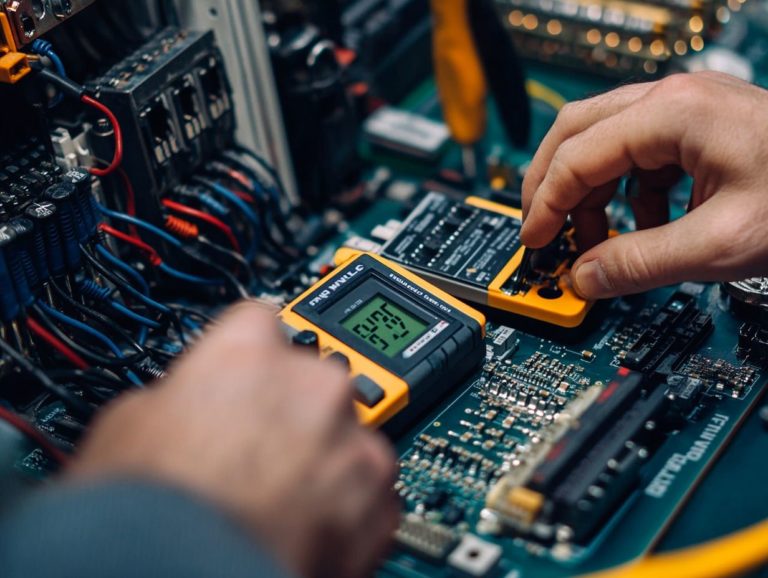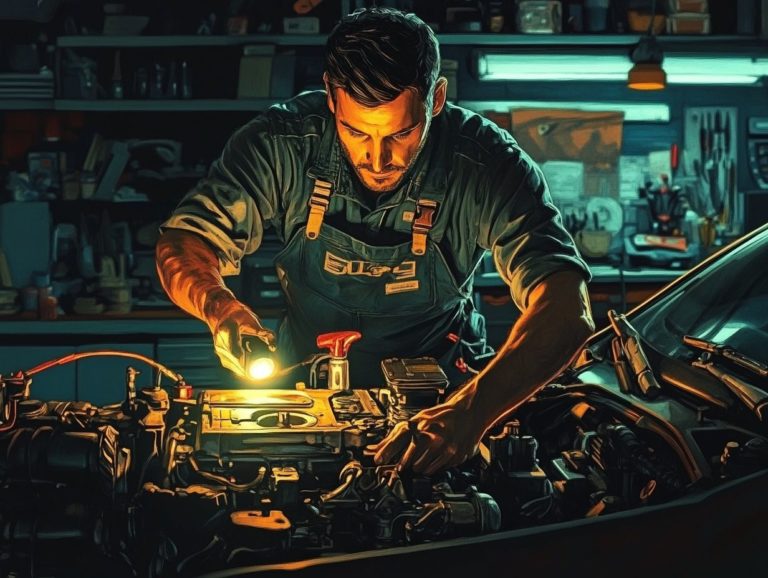Common Electrical Issues in Cars and Fixes
Understanding your car’s electrical system is essential for a smooth and safe driving experience.
Electrical problems can be frustrating. From flickering lights to a vehicle that won t start, knowing the basics can help.
Ready to tackle your car’s electrical issues? This article guides you through identifying problems, understanding their causes, and knowing when to call in the experts!
You ll also find essential maintenance tips to help prevent future electrical headaches. Prepare to dive in and expand your knowledge!
Contents
- Key Takeaways:
- Common Electrical Problems in Cars
- Fixing Electrical Issues in Cars
- Preventing Electrical Problems in Cars
- Frequently Asked Questions
- What are some common electrical issues in cars?
- How can I tell if my car’s battery is dead?
- What might be wrong if my alternator is acting up?
- Why should I address damaged wiring in my car?
- What should I do if my car’s fuses keep blowing?
- How can I prevent common electrical issues in my car?
- Preventing Common Electrical Issues in Cars
Key Takeaways:

- Regular maintenance can prevent common electrical issues.
- Identifying symptoms early can save time and money.
- Some issues can be fixed DIY, but complex problems need professional help for safety.
Understanding the Electrical System of a Car
The electrical system of your car keeps it running efficiently. It includes the battery, alternator, starter motor, and wiring harness.
These parts work together to power essential functions like the ignition system and electrical accessories, such as power windows and audio systems.
For instance, the battery provides power to start the engine. The alternator recharges the battery while the engine runs.
The starter motor starts the engine, and the wiring harness distributes electricity throughout the car. Regularly check for frayed wires or corroded terminals to minimize breakdown risks.
A multimeter is a handy tool that tests voltage, current, and resistance. It helps you troubleshoot and maintain your electrical system effectively.
Common Electrical Problems in Cars
Common electrical problems can show up as dimming lights or a failed audio system. Recognizing these issues is key to timely troubleshooting.
Battery failures, blown fuses, and faulty wiring can all lead to electrical troubles. Addressing these issues early is essential for smooth journeys.
Identifying Symptoms and Causes
Recognizing symptoms and causes of electrical issues is crucial for effective repairs. Look out for dimming lights, malfunctioning alternators, and ignition troubles.
These symptoms could indicate deeper issues like faulty wiring or a dying battery. For example, intermittent power loss may signal a loose connection or corroded battery terminals.
Using a multimeter lets you measure voltage and resistance easily. This helps you identify the root cause of your electrical issues quickly.
Timely diagnosis boosts performance and extends the lifespan of your vehicle’s electrical system.
Don t wait until something goes wrong! Start checking your vehicle s electrical system today.
Fixing Electrical Issues in Cars
Addressing electrical issues in cars can vary significantly, from straightforward DIY fixes to complex repairs that necessitate the expertise of a professional. This is especially true for challenges such as blown fuses, battery malfunctions, or wiring dilemmas. For more information, check out this guide on how to diagnose common electrical system issues that could compromise both vehicle safety and performance.
Recognizing when to take matters into your own hands and when to consult an auto repair shop is crucial for effective automotive troubleshooting.
DIY Solutions and When to Seek Professional Help
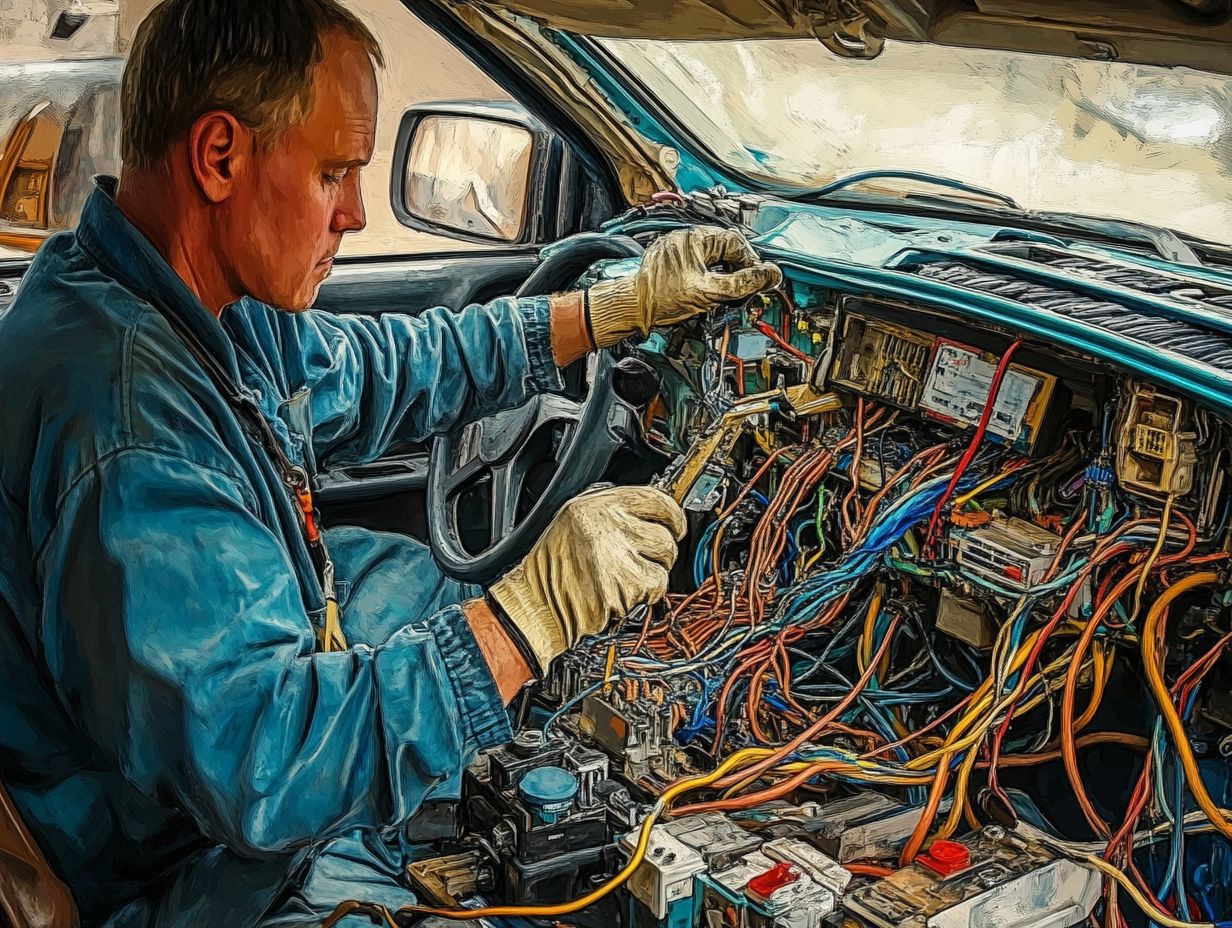
Implementing DIY solutions for common electrical issues can enable you to tackle problems like battery corrosion and blown fuses without rushing to a professional. However, knowing when to seek help from an auto repair shop is equally vital for ensuring your safety and the integrity of your vehicle.
Simple tasks, such as visual inspections, can often reveal the source of your troubles. Don t hesitate to call in the experts for more complex repairs.
When addressing minor issues, checking connections and tightening loose wires can save you from future headaches. Regularly cleaning your battery terminals to keep them free from corrosion is another way to ensure your vehicle performs at its best.
If you run into problems with the electrical system think ignition issues or wiring complications it s best to consult a professional. Recognizing the limits of your DIY skills is essential; while some fixes may seem straightforward, intricate electrical faults can pose safety risks and truly require the expertise of trained technicians.
Preventing Electrical Problems in Cars
Preventing electrical issues in your car is crucial for maintaining optimal performance and avoiding expensive repairs. By incorporating regular electrical maintenance into your routine, you can greatly diminish the chances of problems like overloaded circuits and corrosion.
Simple practices, such as checking battery terminals, can significantly enhance the longevity and reliability of your vehicle’s electrical system.
Maintenance Tips and Best Practices
Implementing effective maintenance tips and best practices can significantly enhance the durability and reliability of your car’s electrical system. This ensures that essential components like the battery, wiring, and safety features operate at their best.
By conducting regular visual inspections and routine checks, you can spot potential wiring issues early. This extends the lifespan of critical automotive electrical parts.
Monitoring your battery’s health is crucial. Checking the terminals for corrosion and ensuring tight connections can greatly improve overall performance.
It’s wise to clean the battery terminals regularly and consider a voltage test to verify that the battery is functioning at peak efficiency.
Safety features like fuses and circuit breakers should be routinely inspected for any signs of wear or malfunction. Understanding the role of these components not only protects your vehicle but also contributes to a comprehensive electrical maintenance strategy that prioritizes both safety and efficiency.
Frequently Asked Questions
What are some common electrical issues in cars?
Some common electrical issues in cars include:
- Dead battery
- Faulty alternator
- Damaged wiring
- Malfunctioning fuses
How can I tell if my car’s battery is dead?
Some signs of a dead battery include:
- The car not starting
- Dim lights
- A clicking sound when turning the key in the ignition
What might be wrong if my alternator is acting up?
A faulty alternator can be caused by:
- A worn-out belt
- A bad voltage regulator
- A malfunctioning diode
Why should I address damaged wiring in my car?
Don t ignore damaged wiring it can lead to serious issues. It can cause electrical shorts, malfunctioning components, and even fire hazards.
What should I do if my car’s fuses keep blowing?
If your car’s fuses keep blowing, it could be a sign of a larger electrical issue. It’s best to have a professional mechanic inspect and diagnose the problem.
How can I prevent common electrical issues in my car?
To prevent common electrical issues, consider regular inspections and maintenance of your vehicle’s electrical system. Don’t hesitate to consult a professional if you’re unsure about any issues.
Preventing Common Electrical Issues in Cars
Regular maintenance can help prevent common electrical issues in your vehicle. This includes testing the battery and checking the alternator.
Inspect the wiring and fuses for any damage. Addressing these issues promptly keeps your car safe and functional.
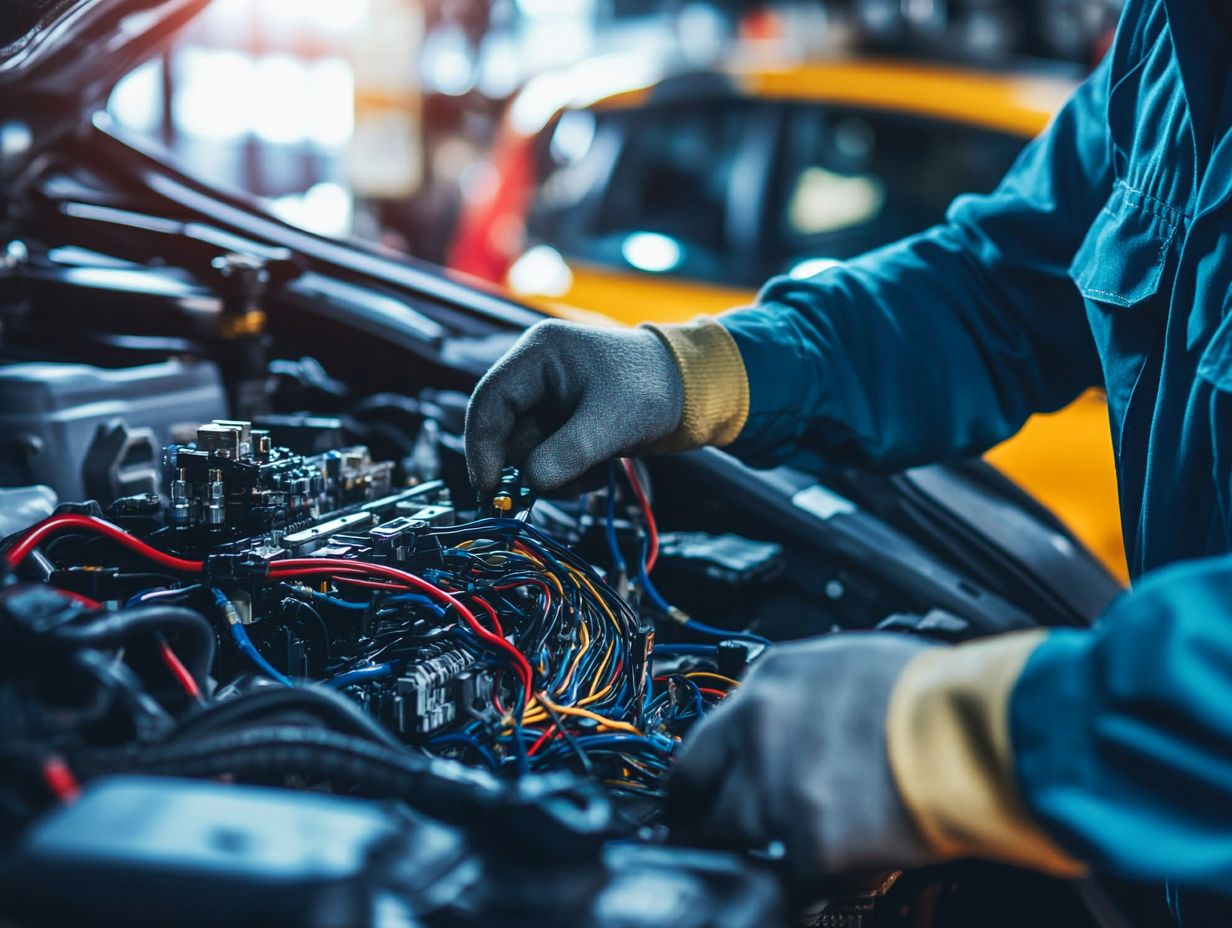
Damaged wiring can lead to electrical shorts and even fire hazards. It’s crucial to fix these problems to ensure safety.
If your car’s fuses keep blowing, it might indicate a larger electrical issue. Have a professional mechanic investigate it.
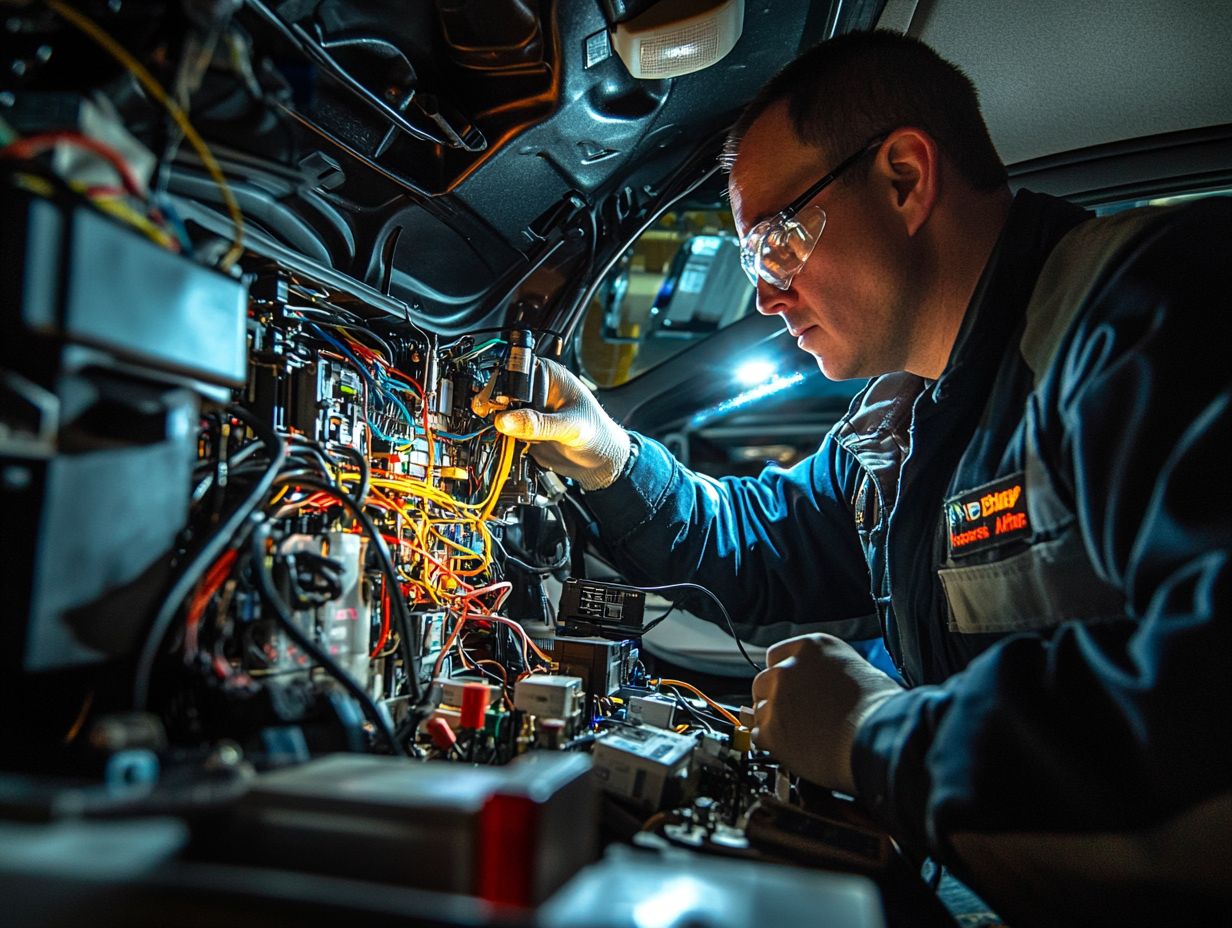
Signs of a dead battery include the car not starting, dim lights, and clicking sounds when you turn the key. If you notice these, it’s time for a check.
A faulty alternator may be caused by a worn-out belt or a malfunctioning part. Regular inspections can help catch these problems early.

